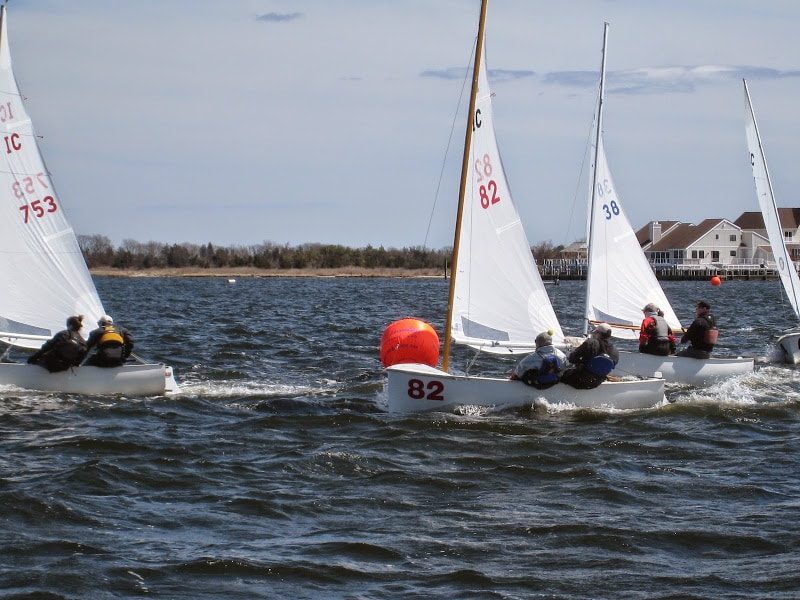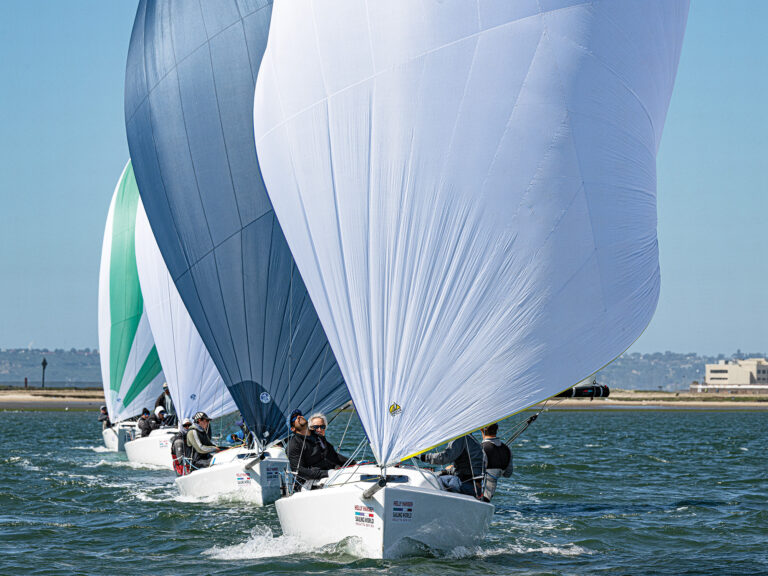
The winter of 2015 was hard on the Northeast, but it was particularly cruel to frostbiters. Even the hardiest dinghy sailors, used to donning drysuits to do weekly battle, were thwarted many weekends by the weather. Either it was blowing too hard, snowing too hard, or too cold, or a combination of all three. Or it had simply been cold for so long that the usual race venues were enveloped in ice.
The Interclub Dinghy Class, which has provided spirited frostbite competition since the mid-forties on Long Island Sound and other Northeast waters, was one of the casualties. Its founding fleet at Larchmont Yacht Club, which sees around 30 of the 11’6” dinghies on the starting line each Sunday from late October through March, lost 9 of its 22 racing days this winter compared to the average 3 per season. The main culprit was ice, which grew to 17 inches thick in Larchmont Harbor.
“The old-timers said it was the worst freeze since the Sixties,” said Larchmont sailor Peter Saladino.
Fellow Interclub sailors in Manhasset Bay, Rochester and Boston told similar stories of losing February and most of March to ice.
By late January, Manhasset Bay was frozen, with the ice eventually extending across Long Island Sound all the way to City Island. The fleet lost over 10 race days, including its entire winter series.
Winthrop Frostbite Sailing Club, which sails out of Cottage Park YC on Boston Harbor, lost more than just race days. It also lost its Race Committee Hut, a cozy structure complete with wood-burning stove that sat atop a floating dock. The Hut broke free from its mooring during Winter Storm Neptune in mid-February, due to high winds and/or pressure from ice floes. It then made a five mile journey southeast out of the harbor into the Atlantic before washing up on the beach in Hull, Massachusetts and disintegrating. The Winthrop fleet is currently raising funds to replace the hut and so far has over $6,500 of its target $10,000.
Despite the truncated season, 25 Interclub racers made the trip to Metedeconk River YC in Brick, N.J. in early April for the annual national championship. Besides the promise of warmer temperatures and ice-free waters, regatta organizer Keith Taboada provided an additional enticement: no entry fee, thanks to a unique title sponsorship from nutritional products firm Medifast, Inc. While he hoped for a 50-boat turnout, Taboada conceded that the winter weather took its toll, as some boats in Boston were still covered in snow in late March.
One Winthrop sailor making the trip was Jim Bowers, who won the last three Nationals with crew Alexa Shuler. Bowers grew up sailing on shifty Mystic Lake in Medford, Ma. and then became an All-American at Harvard, where he regularly sailed Interclubs. While Bowers joked that his background gives him “an unfair advantage,” he came into Nationals having sailed only one brief practice session. He was also pairing with a new crew, Winthrop regular Gaelen Adam.
Bowers and Adam gelled quickly in the breezy conditions on day one of Nationals, opening with a 7th and then winning four of the next six races to take a commanding lead. They kept it up in lighter conditions on Sunday, winning two more races to take a 20-point win over another former national champion team, Paul-Jon Patin and Felicity Ryan from Larchmont. Last year’s runner-ups, Dave Nelson and Julia Marsh from Winthrop, were third, another three points back.
Finishing a bit further down in the pack in 13th was multi-class champion Neal Fowler, a former Interclub sailor at Hyannis YC who now spends winters crewing on the Lightning Southern Circuit. Fowler admitted to some serious rust but still enjoyed the tight racing. He appreciates the class’s weight minimums—315 lbs. combined crew weight and 250 lbs for the boat (which can be met by adding lead)—which allow big and small skippers to compete on a level playing field in a variety of conditions.
“I’ve only sailed the boat once in the last five years,” says Fowler. “But it’s like a member of the family—I’m not selling it.”









